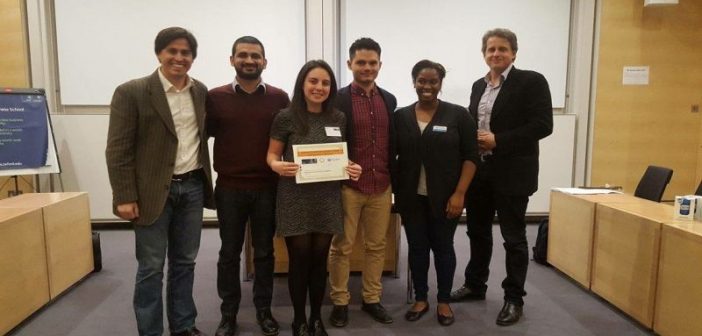The Oxford Social Innovation Case Competition (OSICC) is an annual one-day competition where registered student teams are given one of three cases centered on a social enterprise facing complex and interesting challenges. They have one full-day to formulate strategic and relevant solutions to those challenges before presenting them to a panel of distinguished judges, who will then select the winner for each case.
The third annual Oxford Social Impact Case Competition took place at Saïd Business School on April 30, 2016 with 18 teams from across the University of Oxford and Oxford Brookes University taking part.
‘This year’s Case Competition featured many firsts – it was the first time the competition featured three pioneering case organisations, the first time it was opened up to teams of students from Oxford Brookes University, and the first time that Prodigy Finance came on board as a sponsor,” Min Ji Kim, (MBA 2015-16), chair of the organising committee, said.
“The event was also notable for its diversity. We were joined by University of Oxford and Oxford Brookes students from all sorts of degree programmes, at both undergraduate and graduate levels. So it was not surprising that the event appeared to be wrapped in an entrepreneurial spirit, and competitiveness was balanced by fun and a willingness to learn from others,” she added.
This year’s event was sponsored by Prodigy Finance and the Skoll Centre. Participants were split into three streams, each focused on a challenge faced by a different, mission-focused business. The three businesses profiled by the cases were Audazzle, creators of social games that are inclusive of the blind and hearing-impaired, Prodigy Finance, which offers loans to international postgraduate students attending leading business schools and micro Home Solutions, which focuses on improving the quality of informal housing in Indian cities.
Teams were provided with background information on a business challenge faced by one of the organisations, and interviewed representatives of the organisation on the day. In the afternoon, the teams presented their strategic recommendations to a panel of judges, which included Rodolfo Lara Torres, Director for Programmes and Alumni Relations at the Rhodes Trust at Oxford University and Dr. Forrest Metz, Founder and Managing Director of Dev Equity, among others.
The winners in Audazzale case were Annie Rose Barge (Bsc, International Hospitality Management 2016, Oxford Brookes).
mHs case winners were Teodora Zareva (MBA 2015, University of Oxford), Noura Ismail (MBA 2015, University of Oxford) and Tarun Varma (MBA 2015, University of Oxford).
Prodigy case winners were Kinshuk Kocher (MBA 2015, University of Oxford), Amy Orben (D.Phil in Experimental Psychology 2019, University of Oxford) and Vira Ameli (D.Phil in Social Policy and Intervention, 2018, University of Oxford).
The three winning teams received a cash prize of GBP300.
MBA student Min Ji Kim, in a blog, later confessed that she had taken Prodigy Finance to be “a conventional financial institution with a conventional student loan product.” She was initially sceptical as to how the company was compatible with the objectives and identity of the OSICC.
“There was a personal colour to my scepticism. Before I enrolled in the MBA programme here at the University of Oxford, I was an official in the International Labour Organisation (ILO), the UN agency with the mandate to research global employment trends and promote decent employment for all. In the wake of the 2008 Financial Crisis, the organisation found itself very much connected to the consequences of that fall-out and compelled to advocate for millions of ordinary people and families around the world whose livelihoods and, sometimes, survival were suddenly threatened as a result of the irresponsible conduct of the financial sector,” she writes.
The situation led to growing popular disillusionment with capitalism. Beyond it, it was increasingly accepted as fact that capital and community well-being were diametrically opposed.
“However, incredibly, Prodigy Finance demonstrates that this does not have to be the case. Founded on the conviction that a person’s country of birth or socio-economic background or lack of a credit history in one fixed country should not hinder her from accessing the world’s top business schools for lack of financing, Prodigy has found an ingenious way to mobilise the often dispersed but high-impact power of the community to invest in not just financial capital but the more important human capital,” she says.
Even before online crowdfunding was “a thing” Prodigy had developed an online platform through which international students could receive relatively low-interest loans that are fully funded by the alumni of their MBA programme. More than 70% of Prodigy loan recipients are students from developing countries, and more than 80% of the company’s clients could not have accessed the financing necessary to accept the offers they received from top academic institutions had it not been for Prodigy,” she adds.




